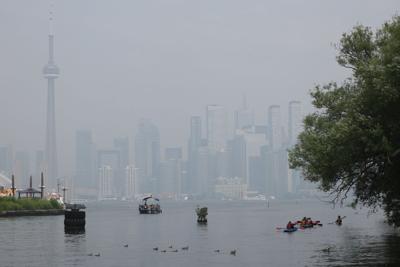As I watched a group of beachgoers build a bonfire one recent night in Long Point, the smell of woodsmoke awakened memories of summers long gone.
Yet while scent is a powerful emotional trigger for the past, it canÔÇÖt obscure the reality of our present: During this unprecedentedly hot and smoky summer, in which prolonged high temperatures and minimal rainfall have caused dry conditions across Ontario, was it really a good idea to build a bonfire on the beach?
Our current wildfire season, on track to be the second-worst on record, has been making headlines all summer, as toxic smoke has breached borders and enveloped several North American cities in a polluted haze.
According to a spokesperson for Environment Canada, Ontario alone has issued 654 air-quality alerts related to wildfire smoke since May ÔÇö more than any other province.
During periods of poor air quality, public-health experts recommend taking smoke and its harms seriously: respect the vulnerability of children and seniors, avoid strenuous outdoor activities, close your windows, run an air filter (if possible), wear a well-fitted N95 mask outside.
ItÔÇÖs good advice. Few seem to have taken it.
To be fair, the public has been juggling competing crises since the COVID-19 pandemic began in 2020, including massive geopolitical shifts and well-resourced movements working aggressively to wind back the clock on societyÔÇÖs achievements in public health, human rights and climate science.
ItÔÇÖs within this broader context that I felt inordinately irritated by the aforementioned advice: Stay inside. Keep the kids at home. Most of us canÔÇÖt even stay home from work to care for our children when theyÔÇÖre ill. What are the chances weÔÇÖll be allowed to take a ÔÇťtoxic air pollutionÔÇŁ day?
Wildfire smoke is the crisis of the season, but how are we to protect ourselves from predatory politicians pouncing on such readily exploitable crises to make our lives more difficult and more precarious?
In the United States, the Trump administration is busy dismantling expert-led social infrastructure that touches on every aspect of human health and the environment, undermining hard-won environmental regulations and ÔÇťupdatingÔÇŁ national climate assessments. Our response to U.S. disintegration thus far has been to pass sweeping bills to expedite energy, mining and infrastructure projects; Ontario, British Columbia and the federal government have all approved bills to this effect, and theyÔÇÖve done so in swift succession.
The novelty of co-operation between the feds and the provinces (psst: OntarioÔÇÖs health-care system would like a word) is complicated by concerns about the rapidity with which these bills were pushed through, not to mention how they will play out or what impact they might have on human health and the environment.
Governments that have treated Indigenous communities as an afterthought ÔÇö Ontario, for example, had to amend a bill in June to acknowledge the provinceÔÇÖs duty to consult ÔÇö paint a worrying picture of CanadaÔÇÖs future progress toward reconciliation. And those of us still reeling from the pile-on of ignorance during the pandemic may well detect a kind of ÔÇťClimate ConvoyÔÇŁ building, too. I once saw the term ÔÇťclimate lockdownÔÇŁ used to describe Nova ScotiaÔÇÖs ban on walking, hiking, camping and fishing in wooded areas as a protection against wildfires, and I felt a combination of dread and d├ęj├á vu ÔÇö dr├ęj├á vu, if you will.
If thereÔÇÖs a bright side to history repeating itself, however, itÔÇÖs that it can teach us to recognize the circus before it sets up shop and makes a spectacle out of swallowing fire. In the U.S., Republican lawmakers now dismantling climate and health science made a mockery of genuine public-health concerns when they claimed Canada hadnÔÇÖt done enough to prevent wildfire smoke from crossing the border. Our failure to match their malicious clowning with expert-informed policy rooted in prevention constitutes a serious vulnerability.
When supportive labour protections and substantive investments in clean indoor air turn health and climate knowledge into part of our structural reality, the antagonistic forces of ÔÇťGet back to the officeÔÇŁ and ÔÇťProtect yourself from illnessÔÇŁ may even feel complementary.
Failing to respect expert advice is like ignoring the reason we still gather to build bonfires, even in spite of our increasingly screened-in lives: because although we understand that fire is a destructive force, we know that it has the power to bring us together, too.
Error! Sorry, there was an error processing your request.
There was a problem with the recaptcha. Please try again.
You may unsubscribe at any time. By signing up, you agree to our and . This site is protected by reCAPTCHA and the Google and apply.
Want more of the latest from us? Sign up for more at our newsletter page.































To join the conversation set a first and last name in your user profile.
Sign in or register for free to join the Conversation